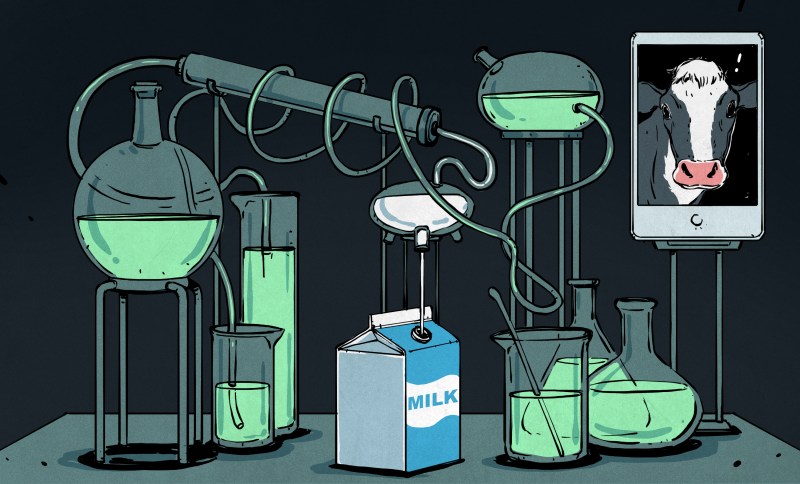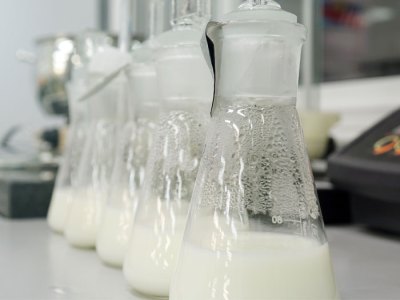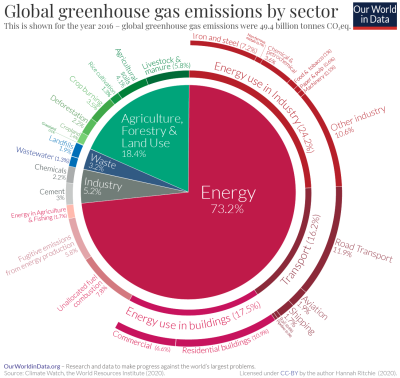They Milk Cows, Don’t They?

You’ve no doubt heard of the many alternatives to cow’s milk that are available these days. Perhaps you’ve even tried a few of them in your quest to avoid lactose. Some coffeehouses have already moved on from soy milk, offering only oat or almond milk instead of 2% and whole. Their reasoning is that soy milk is a highly processed product that can’t be traced back to a single source, which stands in stark contrast to all those bags of single-origin coffee beans.
These nut-based alternatives kicked off what is known as the milk wars — the dairy industry’s fight against labeling plant-based dairy alternatives as ‘milk’ and so on. Well, now it’s getting even more interesting. A company called Perfect Day is making milk using microorganisms that secrete milk proteins. It may sound kind of gross, but it’s essentially microbial fermentation, which is the normal process by which bread, cheese, yogurt, wine, and beer are made.
To be fair, what Perfect Day and other companies are doing is precision fermentation using genetically engineered microorganisms in a bioreactor, so it’s a bit more involved than what you could probably pull off in the basement. Precision fermentation lies somewhere between two modern extremes — plant-based meat and cultured meat. The latter is actual animal tissue grown from stem cells, and is only available at high-end restaurants for exorbitant prices.
What is Milk, Anyway?

The stuff that Perfect Day pumps out is real milk, no doubt about it. As it turns out, milk is relatively easy to create — it consists of six proteins, plus some fats, sugars, and minerals, all in a water suspension.
Even so, both the US and the UK have fairly restrictive definitions for ‘milk’, ‘cheese’, and ‘dairy’. In the US, the FDA currently defines milk as “the lacteal secretion, practically free from colostrum, obtained by the complete milking of one or more healthy cows“, which sounds like it leaves no room for microbial fermentation. However, the FDA already approves of fermentation for cheeses and so on, so they’re kind of in a tight spot.
Things are even more strict across the pond, where plant-based dairy alternatives are basically unwelcome. In 2017, the European Court of Justice ruled that dairy terms such as ‘milk’, ‘cheese’, and ‘butter’ could only be used to describe animal products and not plant-based products. In 2020, Amendment 117 passed in favor of making it illegal for comparisons between the two to be made at all.
The Glass is Half Full

Surely the dairy industry will lobby against lab-grown milk — they probably already are. But the dairy industry doesn’t really have a leg to stand on. It is wrought with problems, from over-milking cows to over-breeding them to routinely ripping cow families apart.
Plus, the dairy industry is responsible for 4% of greenhouse gas emissions, which is more than shipping and aviation put together. Considering the climate crisis, it’s utterly ridiculous to impede progress on this front.
There are a lot of upsides to lab-created milk. Thanks to precision fermentation, it could be brewed to be healthier than cows’ milk. All they would need from cows in the future would be small tissue biopsies to get the stem cells.
Without whole cows, there’s no need for hormones or antibiotics, and the milk could be made without lactose and even filled with healthy fats and nutrients. That is, if companies so choose. I would certainly like to see that happen and will be voting with my wallet if so.
Post a Comment